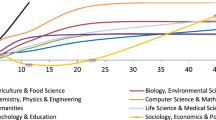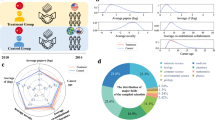Abstract
Researchers in academia typically perform different tasks: research, teaching and services to the scientific community. We analyze the opportunity costs in terms of a potentially reduced publication productivity associated with becoming a dean in the German institutional setting where deans are non-professional expert-leaders who temporarily take the dean position. Theoretically, we distinguish between two different effects that relate deanship and publication productivity: a resource effect where publication productivity during and—as a result of potentially having developed a taste for service—also post deanship decrease as a result of a reduction of the available time for research and a self-selection effect where pre-deanship publication productivity is lower than that of peers who are not about to become dean. Based on a dataset of 1110 business and economics researchers from German-speaking universities, we find evidence for a resource effect with leadership in academia reducing research productivity during and also post deanship. We find no evidence of a negative self-selection effect in the sense of less successful researchers being more likely to take the position of a dean. Reduced research productivity during and post deanship as compared to those researchers that never became dean is driven by those researchers who become dean in later periods of their career, i. e., presumably by those who deliberately shift their focus away from research and towards a stronger engagement in the scientific community in their late career years. Early career deans, on the contrary, seem to see their deanship more as a transitory role and are able to compensate the reduced resources during deanship, and they also do not suffer from a reduced publication productivity post deanship.
Similar content being viewed by others
Notes
The mean value for the dean variable is 0.011, which equals the average number of years in the dean’s office for researchers who were dean (2.478, panel C of Table 1) divided by the average number of yearly observations for deans (29.130, panel C), times the share of deans in the sample (138/1110). Thus, the mean value 0.011 represents the time spells (observation years) of deans among all time spells (observation years). The share of researchers in our data who had been a dean during the observation period is about 12.5%.
When running a balanced panel estimation in which only researchers are included for which all three post-deanship years are available, we find similar results.
The age of becoming a dean is empirically related to our control variables “year of birth” and “age at doctorate”. More recently born researchers in our sample are more likely to be “early” deans since they have fewer “late career years” in which they could become a “late dean”. Also, “early” deans were older when they obtained their doctorate.
References
Aguinis, Herman, Gideon P. de Bruin, Danielle Cunningham, Nicole L. Hall, Steven A. Culpepper, and Ryan K. Gottfredson. 2010. What does not kill you (sometimes) makes you stronger: Productivity fluctuations of journal editors. Academy of Management Learning & Education 9(4):683–695.
Ayaita, Adam, Kerstin Pull, and Uschi Backes-Gellner. 2017. You get what you ‘pay’ for: academic attention, career incentives and changes in publication portfolios of business and economics researchers. Journal of Business Economics. https://doi.org/10.1007/s11573-017-0880-6.
Backes-Gellner, Uschi, and Axel Schlinghoff. 2010. Career incentives and “publish or perish” in German and US universities. European Education 42(3):26–52.
Backes-Gellner, Uschi, and Eva Zanders. 1989. Lehre und Forschung als Verbundproduktion: Data-Envelopment-Analysen und organisationsökonomische Interpretationen der Realität in wirtschaftswissenschaftlichen Fachbereichen. Zeitschrift für Betriebswirtschaft 59(3):271–290.
Bäker, Agnes. 2015. Non-tenured post-doctoral researchers’ job mobility and research output: an analysis of the role of research discipline, department size, and coauthors. Research Policy 44(3):634–650.
Bäker, Agnes, and Amanda H. Goodall. 2017. The best academics make the best heads of department. Times Higher Education, 04.05.2017
Bäker, Agnes, Susanne Breuninger, Julia Muschallik, Kerstin Pull, and Uschi Backes-Gellner. 2016. Time to go? (Inter-)national mobility and appointment success of young academics. Schmalenbach Business Review 17(3):401–421.
Bolli, Thomas, and Jörg Schläpfer. 2015. Job mobility, peer effects, and research productivity in economics. Scientometrics 104(3):629–650.
Ellison, Glenn. 2002. The slowdown of the economics publishing process. Journal of Political Economy 110(5):947–993.
Evans, Ian M., and Luanna H. Meyer. 2003. Motivating the professoriate. Higher Education Management and Policy 15(3):151–167.
Fox, Mary Frank .1992. Research, Teaching, and Publication Productivity: Mutuality Versus Competition in Academia. Sociology of Education 65(4):293.
Goodall, Amanda H. 2009. Highly cited leaders and the performance of research universities. Research Policy 38:1079–1092.
Goodall, Amanda H., and Agnes Bäker. 2015. A theory exploring how expert leaders influence performance in knowledge-intensive organizations. In Incentives and Performance: Governance of Knowledge-Intensive Organizations, ed. Isabell M. Welpe, Jutta Wollersheim, Stefanie Ringelhan, and Margit Osterloh, 49–68. Cham: Springer.
Goodall, Amanda H., John M. McDowell, and Larry D. Singell. 2017. Do economics departments improve after they appoint a top scholar as chairperson? Kyklos 70(4):546–564.
Hattie, John, H. W. Marsh. 2016 The Relationship Between Research and Teaching: A Meta-Analysis. Review of Educational Research 66(4):507–542.
Hollis, Aidan. 2001. Co-authorship and the output of academic economists. Labour Economics 8(4):503–530.
Krapf, Matthias. 2011 Research evaluation and journal quality weights. Zeitschrift für Betriebswirtschaft 81(1):5–27.
Krücken, Georg, Albrecht Blümel, and Katharina Kloke. 2013. The managerial turn in higher education? On the interplay of organizational and occupational change in German academia. Minerva 51(4):417–442.
Manchester, Colleen, and Debra Barbezat. 2013. The effect of time use in explaining male-female productivity differences among economists. Industrial Relations: A Journal of Economy and Society 52(1):53–77.
Rauber, Michael, and Heinrich W. Ursprung. 2008. Life cycle and cohort productivity in economic research: the case of Germany. German Economic Review 9(4):431–456.
Taylor, Susan W., Blakely Fox Fender, and Kimberly Burke Gladden. 2006. Unraveling the academic productivity of economists: the opportunity costs of teaching and service. Southern Economic Journal 72(4):846–859.
Author information
Authors and Affiliations
Corresponding author
Additional information
The authors gratefully acknowledge financial support from the German Federal Ministry of Education and Research (program: “Wissenschaftsökonomie”, grant number: 01PW11008). The German Federal Ministry of Education and Research had no impact on study design, collection, analysis or interpretation of the data or the writing of the manuscript.
Appendix
Appendix
Rights and permissions
About this article
Cite this article
Backes-Gellner, U., Bäker, A. & Pull, K. The Opportunity Costs of Becoming a Dean: Does Leadership in Academia Crowd Out Research?. Schmalenbach Bus Rev 70, 189–208 (2018). https://doi.org/10.1007/s41464-018-0048-0
Received:
Accepted:
Published:
Issue Date:
DOI: https://doi.org/10.1007/s41464-018-0048-0




